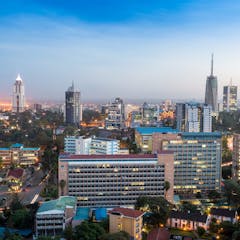
Articles sur Africa
Affichage de 1 à 20 de 1004 articles

In South Africa, huge stockpiles of rhino horn are kept, even though there’s a global ban on trading it.

Humans aren’t the only animals that have names for each other − and studying animals that use names can teach researchers more about how human names evolved.

Sub-Saharan Africa is no longer a continent just grappling with hunger and starvation — it is now also dealing with obesity and overweight.

Giraffe necks are a hot topic among biologists. A new study contradicts an older theory that says male giraffes need long necks to fight over mates.

Polls suggest the ANC is set to lose its majority in South Africa.

African countries require efficient infrastructure networks to boost trade within the region and with the rest of the world.

In Sudan, amid a growing humanitarian crisis caused by a year-long and ongoing war, neighbourhood organizations have stepped in as first responders, and to lead the call for peace.

Tehran is supplying weapons to the Sudanese Armed Forces as they fight a paramilitary group for control of the nation.

Social media platforms need to open up data to Africans and researchers in the global south.

As climate change ravages coastal livelihoods, piracy is on the rise, imperilling seafarers and trade.

Kenya’s William Ruto will meet President Joe Biden during a rare US state visit from an African leader − and one that comes as Haiti’s crisis spirals.

The two human species had many similarities but their communication would have been different.

With both sides in Sudan’s civil war accused of recruiting Islamist militiamen, terrorist groups look set to capitalize on a power vacuum.

Niger’s military government sides with Russia in the latest sign of Moscow’s growing influence in Africa.

Hopes for a peaceful resolution are fading as the Sudan civil war blazes into a second year.

The first dedicated scientific surveys have confirmed the presence of blue whales in Seychelles.

The second episode of What happened to Nelson Mandela’s South Africa?, a three-part podcast series on The Conversation Weekly. Featuring interviews with Mashupye Maserumule and Michael Sachs.

The first episode of What happened to Nelson Mandela’s South Africa?, a three-part podcast series on The Conversation Weekly. Featuring interviews with Steven Friedman and Sandy Africa.

Insights from the book White Fragility also shed light into racism in Arab society.

A lot of good has happened since apartheid ended in 1994. Sadly, 30 years on, the country is in a political and economic crisis. Many are questioning the choices of the past three decades.
